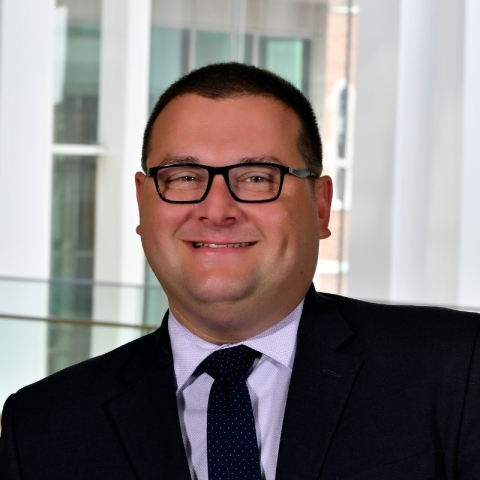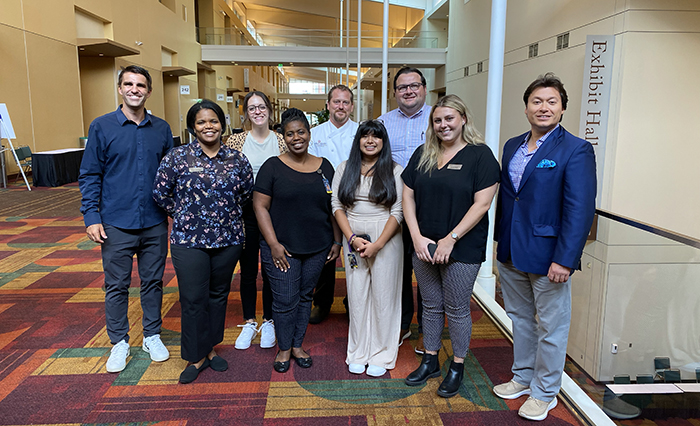Developing an Employee-Centric Workplace Culture With Joshua Vaught, Sodexo Live! General Manager, Indiana Convention Center

Workplace culture can have a direct impact on the overall success of an organization, as it affects how employees perceive their jobs, colleagues and their employer. When staff are happy and motivated in their work environment, they tend to be more productive and engaged, as well as more likely to stay at a company long-term, thus reducing turnover and contributing to the organization’s productivity and financial success.
Contrast that with a toxic work culture that often leads to high employee turnover, low productivity and morale, as well as difficulties in attracting new talent, and it’s not hard to see why a strong, positive workplace culture isn’t just important to an organization’s success, it’s essential for its long-term survival.
In this time of lingering staff shortages in the events industry, businesses can no longer afford to ignore the importance of the kind of workplace cultures they build and foster. So how can event-related organizations build an environment that industry professionals will want to be a part of and feel invested in for the foreseeable future? It all comes down to prioritizing employee well-being, according to Joshua Vaught, general manager of the Indiana Convention Center (ICC), who oversees around 100 team members at the Sodexo Live!-managed facility in Indianapolis.
TSNN had a chance to sit down with Vaught to hear his thoughts about what it takes to build a thriving corporate culture overseen by employee-centric leadership and how Sodexo Live! is doing just that at the ICC.
In the face of workplace shortages and disengaged employees, how can organizations develop a more stimulating and inspiring workplace culture?
There are many ways to create a strong workplace culture, but it has to be genuine and authentic, and not for the sake of checking a box. Helping our teams develop and prioritize a work-life balance is important, particularly in our industry, where hours can be long and nights late, and especially when the meetings and events calendar for Indianapolis is full! Creating that balance helps our team be in control of their work experience and allows them to become more excited about and invested in their own careers.
We do this by implementing a regular cadence of employee recognition programs to call out tenure anniversaries, birthdays and other important points of pride. We also implement monthly team meetings that engage all staff members, so everyone has an opportunity to voice their concerns or ideas.
Everything we do revolves around our role as “experience makers” for our venue partners and the guests we serve, as we aim to always attract top talent, increase employee retention and distinguish ourselves from our competitors as an employer of choice and a great place to work and grow.
How do mental health, career advancement and diversity-boosting initiatives play a role in attracting and retaining happy, engaged and high-performing employees?
When people are happy in their work, they’re more inclined to stick around longer. So, it’s a big priority for us to invest in our teams, find their strengths and passions, and help them grow to build a true career with us. Our employee assistance program (EAP) offers always-on, confidential mental health support. This includes face-to-face counseling by BACP-accredited counselors and e-mail and phone support 24 hours a day, 365 days a year.
We want to be the kind of employer that breaks the mental health stigma, gives people the support they need and creates a culture that cares. And the numbers speak for themselves: The average tenure for overall Sodexo Live! full-time employees is seven years, well above the average of the hospitality industry, and we most recently achieved an 80 percent satisfaction and engagement rate among employees.
What programs has your convention center implemented along these lines and what kinds of measurable results are you seeing as a result?
We’re a very hands-on convention center here. All of our Sodexo Live! managers and supervisors are engaged and encouraged to support in all aspects of events — from planning to day-of implementation and post-event review. This allows our teams to learn what they like most, so they can move around in the future if a different type of position opens up. And this could be at the Indiana Convention Center and Lucas Oil Stadium, or other venues we serve locally, like the Indianapolis Zoo or NCAA Museum. The options are truly endless.
We also encourage staff to shadow other managers if they’re looking to expand their knowledge and background. In fact, we recently had a team member in an administrative position who wanted to learn more about the complete sales process. We paired her up with a sales manager, and she was able to assist with all aspects of the event from start to finish! At the end of the day, we’re running a business, but it’s not entirely about the bottom line. It’s important to focus on how we make our staff and, in turn, our guests feel.
Workplace problems often start from the top down. What does it take to weed out “toxic” bosses and develop more employee-centric leadership?

This goes in all directions. Everyone needs to be held accountable for fostering a positive workplace, no matter what your position is. That means leading by example and speaking up if someone is being consistently negative or unsupportive. As a leader, I’m meant to be that person that anyone can come to for help, to ask questions and voice concerns, and this means having to address tough situations. Providing hospitality for thousands of people is no easy feat, and while someone’s title may be higher than the next person’s, we still have to operate as one team every time, or the ship doesn’t float.
Is the industry’s current focus on mental health and diversity just a PR-friendly trend or a sincere and lasting movement and why?
Erasing the stigma against mental health is an important initiative for companies of all sizes right now, and I personally am happy to be part of the positive momentum. At the end of the day, we want to create the best experience possible for our guests, and ensuring we have a happy team naturally creates a happier guest experience. In fact, as part of our new Employer Value Proposition that helps us attract and retain our best-in-class team, we gather quantitative yearlong findings from more than 50 surveys of our employees across all roles to better understand how they’re feeling and how we can support them.
What is your advice for how organizations can transition their workplace cultures into those that attract and retain top talent?
Listening to your employees is key. Always make time to talk to them and see what they would like to see in their work environment. We all have different perspectives, and someone may be seeing something that you may have never thought about. As a senior leader, it’s then your job to look at the whole business and see what best fits the needs of the business and brings in everyone’s elements of expertise. I’ve also thought back to my own past work environments and considered what I would have wanted to see change and what didn’t work for me.
Don’t miss any event-related news: Sign up for our weekly e-newsletter HERE, listen to our latest podcast HERE and engage with us on Twitter, Facebook and LinkedIn!


Add new comment